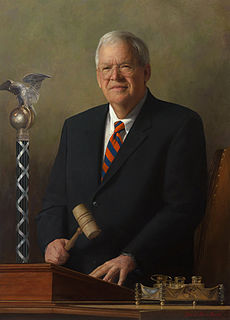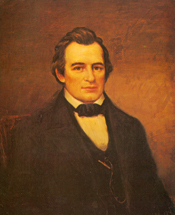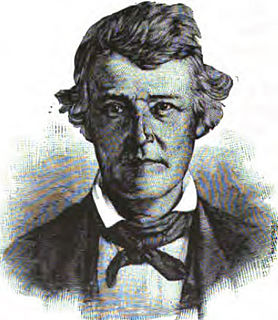Two special elections were held in Kentucky's 11th congressional district in 1827 to fill a single vacancy.
Two special elections were held in Kentucky's 11th congressional district in 1827 to fill a single vacancy.
In the 1827 elections, William S. Young (A) was re-elected to a 2nd term, but died on September 20, 1827 [1] before Congress assembled. A special election was called to fill the resultant vacancy, held on November 5, 1827
| Candidate | Party | Votes [2] | Percent |
|---|---|---|---|
| John Calhoon | Anti-Jacksonian | 2,290 | 57.6% |
| Thomas Chilton | Jacksonian | 1,685 | 42.4% |
The vote of one county had been thrown out, giving the election to Calhoon. By mutual agreement of both candidates, Calhoon subsequently resigned, and both Calhoon and Chilton petitioned the Governor to call a new election, [1] which was held on December 20, 1827.
| Candidate | Party | Votes [3] | Percent |
|---|---|---|---|
| Thomas Chilton | Jacksonian | 3,146 | 50.7% |
| John Calhoon | Anti-Jacksonian | 3,063 | 49.3% |
Chilton took his seat on January 11, 1828 [1]

Elections to the United States House of Representatives for the 109th Congress were held on November 2, 2004. The House of Representatives has 435 seats. It coincided with the reelection of President George W. Bush. In the 108th Congress, Republicans held 227 seats, Democrats held 205, with two Republican vacancies and one independent. As a result of this election, the 109th Congress began composed of 232 Republicans, 201 Democrats, one independent, and one vacancy. The Republicans thereby built up their House majority by 3 seats.

This is a chronological listing, in timeline format, of the United States Congressional Delegations from Delaware to the United States Senate and United States House of Representatives. U.S Senators are elected by popular vote for a six-year term, beginning January 3. Since 1831, elections in Delaware have been held in the first week of November of the year noted. Before 1914 United States Senators were chosen by the Delaware General Assembly and before 1935 all Congressional terms began March 4.

Elections to the United States House of Representatives were held in 1868 to elect Representatives to the 41st United States Congress. The election coincided with the presidential election of 1868, which was won by Ulysses S. Grant.

Elections to the United States House of Representatives for the 37th Congress were held at various dates in different states from August 1860 to October 1861.

Elections to the United States House of Representatives for the 26th Congress were held during President Martin Van Buren's term at various dates in different states from July 1838 to November 1839.

In the United States House of Representatives elections in 1828 and 1829, the Jacksonians soundly took control of the presidency, with Andrew Jackson's victory, and greatly increased their majority in Congress. Outgoing President John Quincy Adams's unpopularity played a major role in the Jacksonian pick-up, as did the perception of the Anti-Jacksonian Party as urban and elitist. Major increases in suffrage also heightened Jacksonian wins, as newly enfranchised voters tended to associate with Jacksonian principles. The Anti-Masonic Party, a single issue faction based on distrust of Freemasonry, became the first third party in American history to garner seats in the House.

John Calhoon was a United States Representative from Kentucky. He was born in Henry County, Kentucky in 1797. He studied law, was admitted to the bar, and practiced.
The United States Senate elections of 1844 and 1845 were elections which, coinciding with James K. Polk's election, had the Democratic Party retake control of the United States Senate, gaining a net total of eleven seats from the Whigs.

The 1802 United States House of Representatives elections in New York were held from April 27 to 29, 1802, to elect 17 U.S. Representatives to represent the State of New York in the United States House of Representatives of the 8th United States Congress.

The 1804 United States House of Representatives elections in New York were held from April 24 to 26, 1804, to elect 17 U.S. Representatives to represent the State of New York in the United States House of Representatives of the 9th United States Congress. At the same time, a vacancy was filled in the 8th United States Congress.

The 1810 United States House of Representatives elections in New York were held from April 24 to 26, 1810, to elect 17 U.S. Representatives to represent the State of New York in the United States House of Representatives of the 12th United States Congress. At the same time, a vacancy was filled in the 11th United States Congress.

The 1816 United States House of Representatives elections in New York were held from April 23 to 25, 1816, to elect 27 U.S. Representatives to represent the State of New York in the United States House of Representatives of the 15th United States Congress. At the same time, a vacancy was filled in the 14th United States Congress.
A special election was held October 2, 1827 in Delaware's at-large congressional district to fill a vacancy caused by the resignation of Louis McLane (J) before the start of Congress, after being elected to the Senate
A special election was held in Georgia's 1st congressional district on October 1, 1827 to fill a vacancy left by the resignation of Edward F. Tattnall (J) prior to the start of the 20th Congress.
A special election was held in Georgia's 2nd congressional district in 1827 to fill a vacancy caused by the resignation of John Forsyth (J).

A special election was held in Kentucky's 2nd congressional district on August 4, 1828 to fill a vacancy in Kentucky's representation.
A special election was held in Maine's 1st congressional district on September 27, 1827 to fill a vacancy left by the death of William Burleigh (A) on July 2, 1827
A special election was held in Massachusetts's 1st congressional district on July 23, 1827 to fill a vacancy caused by the resignation of Daniel Webster (A) on May 30, 1827 after being elected to the Senate.

The 1997 United States elections were off-year elections were held on Tuesday, November 4, 1997, comprising 2 gubernatorial races, 3 congressional special elections, and a plethora of other local elections across the United States. No Senate special elections were held.